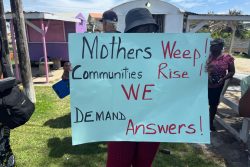Government has released the draft of its Witness Protection Bill which makes provision for the setting up of safe houses and/or new identities for eligible persons who are part of the Witness Protection Programme.
Such a programme has been promised by the APNU+AFC government and the draft Bill in the name of Attorney-General Basil Williams seeks to introduce legislation for the establishment of a Programme for the protection of certain witnesses and other persons. The bill has been published on the Official Gazette website.
Under the bill, offences which may give rise to protection under the Witness Protection Programme include murder, manslaughter, treason, sedition, piracy or hijacking, possession or use of firearms and ammunition with intent to injure, possession or use of firearms in furtherance of any criminal offence, aggravated assault, shooting or wounding with intent to do grievous bodily harm, robbery, robbery with aggravation, armed robbery, arson, any sexual offence, any drug trafficking offence, kidnapping, any money laundering offence, offences under the Criminal Law (Offences) Act (Cap. 8:01), any domestic violence offence and any trafficking in person offence.
Last month, Minister of Governance Raphael Trotman announced that Cabinet has given the nod for the bill to be submitted to the National Assembly. He had said the Witness Protection Bill will establish a programme for the protection of witnesses who give evidence in the court, including the protection of their families against intimidation and/or physical harm during and after their involvement in court proceedings. He had said among the proposed measures are the establishment of safe houses, granting of assistance to participants and the provision of new identities, where necessary.
According to the Explanatory Memoran-dum, Part II of the Bill provides for the establishment of the Witness Protection Programme and three agencies – an Administrative Centre, an Investigative Agency and a Protective Agency – to administer the Programme. It lays out the functions of the three agencies and their interdependence on each other for the effective and proper administration of the Programme.
It requires the disclosure of certain information to the Administrative Centre by the prospective participant, the prospective participant’s application to be in the prescribed form, that the participant understands the implications of being included in the Programme and that he understands and signs the Memorandum of Understanding (MOU).
In relation to criminal matters, the Director of Public Prosecutions, where satisfied that the circumstances so warrant, shall prepare and submit the application in the prescribed form.
Part III identifies the agency that will prepare the MOU, the persons who will be eligible to sign which is either the prospective participant or a guardian, and countersign (the person authorised by the President for the purpose), and how the MOU may be varied.
Part IV provides for a register of participants which shall contain detailed information in respect of each participant. It makes mandatory that all ancillary documents – the original of each MOU, new identities issued under the Programme, the original of each approval granted by the Centre, identity documents returned to the Centre – and the register shall be kept by the Centre.
This Part further gives access to these documents and the register, only to the Centre. However, in the interest of the due administration of justice, the Centre may allow another approved authority to have access to the ancillary documents and the register. Where the Centre allows another approved authority access, the Centre shall notify the approved authorities of such access.
The bill identifies an approved authority as the President, the Attorney General, the Director of Public Prosecutions, the Administrative Centre, the Commissioner of Police or any other person or body that the President may, from time to time, designate as an approved authority;
Part V provides for the protection of the participant and in instances where the participant has been provided with a new identity he must obtain written approval from the Administrative Centre before he discloses his former identity. Further, protection and assistance under the Programme may be terminated by the participant or the Centre and where the Centre considers it appropriate, it may restore the participant’s former identity.
It also provides that the participant has 28 days after receiving notification from the Centre, in regard to either the termination of protection or assistance or both or where there is a decision to restore the participant’s former identity, to apply to the President for a review of the decision and the President shall allow him a reasonable opportunity to state his case.
Part VI makes it an offence, for a person without lawful authority, a person who has been a participant or a person who has undergone assessment for inclusion in the Programme, to disclose any information about the Programme. It is also an offence for a person to offer a bribe to a person employed in the administration of this Act or being a person employed in the administration of this Act, to accept a bribe.
According to the draft Bill, persons committing these offences are liable on summary conviction to a fine of $1 million and to imprisonment for 10 years.









